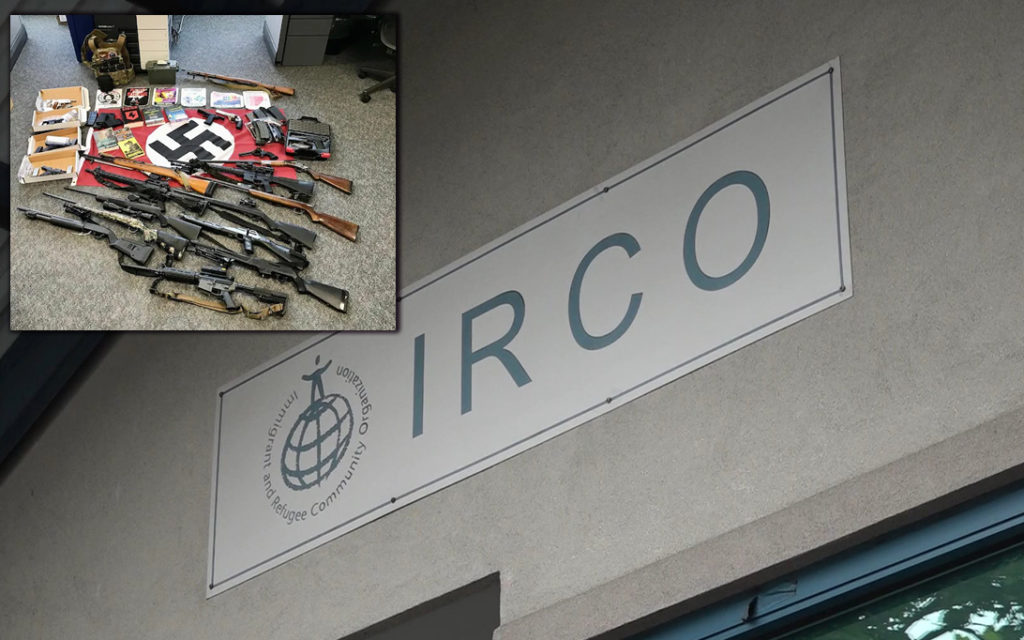White Man Forced to Write Essay After Pleading Guilty to a “Hate” Crime Charge After Being Caught Putting a Sticker on the Fence of the Invader Community Organization in Oregon
Also received two years of probation, 50 hours of community service, a stay away order from those IRCO buildings, and a requirement to write a letter of apology…

Editor’s note: Portland, Oregon is becoming more and more known to being an anti-White haven. After so much crime non-Whites have done to that city (Floyd riots) and never received any jail time or charges it’s not a complete shock at this point that criminals are taking advantage of Whites giving them ridiculous charges/sentencing . And it’s especially tough if you’re a pro-White. This guy got it for simply putting up a sticker!
—
Washington Poop writes:
In April, Jarl Rockhill placed a sticker with racist imagery — a man making a Nazi salute below the word “pure” — on the fence of the Immigrant and Refugee Community Organization, a nonprofit organization in Portland, Ore.
Upon identifying Rockhill in surveillance footage, investigators determined that he was a member of a Portland neo-Nazi group, according to court documents. After he was arrested in May, the Oregonian reported, police recovered several firearms and a Nazi flag in a search of his house and car.
In late November, Rockhill, 35, pleaded guilty to a bias-crime charge, or hate crime, and received his sentence: homework.
A judge ordered that Rockhill must read a book and watch a film — “Between the World and Me” by Ta-Nehisi Coates, which discusses racism in the United States, and “Myanmar’s Killing Fields,” a documentary on the genocide of Rohingya Muslims in Myanmar — and write two essays of 750 and 500 words about them that a probation officer deems “genuine.”
Rockhill took the plea deal, which also includes two years of probation, 50 hours of community service, a stay-away order from IRCO buildings and a requirement to write a letter of apology to IRCO, on Nov. 30, according to Multnomah County court records. An attorney for Rockhill declined to comment.
Rockhill’s sentence comes as Multnomah County’s district attorney weighs an approach based on restorative justice — a rehabilitative criminal justice framework often cast as an alternative to traditional punishment — in sentencing low-level bias crimes, sociology professor and extremism researcher Randall Blazak told The Washington Post.
Blazak, the vice chairman of a committee implementing Oregon’s bias-crime laws, said prison time can radicalize some offenders instead of rehabilitating them.
“Hate groups are waiting for these folks [in prison] with open arms,” Blazak said. “If you’re really interested in reducing harm to the community, sometimes it’s kind of backwards to send a lower-level bias-crime offender into prison, where they will get indoctrinated and become serious hate mongers.”
He added that the investigation into Rockhill uncovered “red flags” and that probation officers should ensure his responses are genuine.
Miri Cypers, the regional director of the Pacific Northwest branch of the Anti-Defamation League (ADL), assisted in the police investigation into Rockhill and praised the work that led to his prosecution, adding that hate crimes are often underreported and hard to prosecute. She called the sentencing “an interesting approach.”
“As an organization, we do value restorative justice and the importance of working with people,” Cypers said in an interview with The Post. “On the other hand, I hope that the judge did consult with the community that was impacted to ensure that they felt safe.”
IRCO declined to comment. The organization, which assists arriving refugees and immigrants in Oregon, told Portland police that Rockhill’s sticker caused concern in the community around the office.
According to court documents, Cypers and the ADL told Portland police that the image on Rockhill’s sticker stood for a neo-Nazi white-supremacist group that advocates for “lone wolf violence against Jews, immigrants and other communities of color.”

Cypers said that, in her experience, while some hate-crime defendants merit more “accountability” when prosecuted, others could be receptive to more restorative sentences.
“There are some people who are really adherent to [extremist] ideology, and I think there are some people who are brought into this world and are kind of suffering from other conditions [and] economic disparities,” Cypers said. “I think some can be rehabilitated after understanding the impact of their actions.”
Blazak cited examples of successfully rehabilitated extremists who went on to found anti-racist organizations.
“There is a way of leading these people out,” Blazak said. “I think throwing them in prison just amplifies their hate. I think restorative justice offers a better path.”
Rockhill’s assignments are a nonfiction book and film that have both won awards for their examinations of oppression in the United States and abroad. “Between the World and Me” won the National Book Award for Nonfiction in 2015. “Myanmar’s Killing Fields,” a 2018 documentary from PBS’s Frontline series, investigated the Myanmar military’s genocide against the country’s Rohingya Muslim population and won a BAFTA award for current affairs in 2019.
Evan Williams, who produced and reported in the documentary, said he was surprised but pleased to hear that it was being used to educate someone convicted of a hate crime.
“I think from a filmmaker’s point of view, it’s fantastic,” Williams told The Post. “It’s the first time I’ve heard of it being used this way.”
Williams said he hoped the film would create empathy for refugees by illustrating why some choose to flee their countries for the United States. He praised the bravery of Rohingya videographers who filmed some of the documentary’s content and facilitated the involvement of foreign reporters while under threat.
“If the film changed that one individual’s point of view, that would be worth all the effort,” he said.
Multnomah County Circuit JudgeChristopher Ramras, who issued Rockhill’s sentence, has handed out similar assignments in the past. In 2019, he agreed to conditionally waive a hate-crime charge for Harold Denson III, who allegedly threatened and yelled at a Ukrainian immigrant to go back to his country. Instead, Ramras asked Denson to “put yourself into their shoes” and write an essay about the challenges facing Eastern European immigrants entering the United States, the Oregonian reported.
Autumn Shreve, a former public defender who represented Denson, told The Post in an interview that she appreciated Ramras’s willingness to provide an alternative sentence for Denson, who was experiencing homelessness at the time.
“I appreciate the opportunity to write a report and find alternate means rather than stacking another charge on my record,” Denson said after receiving the sentence.








